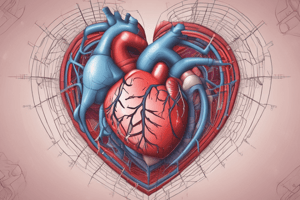Podcast
Questions and Answers
What are the main causes of heart failure outlined in the text?
What are the main causes of heart failure outlined in the text?
Myocardial infarction, Hypertension, Valvular heart disease, Volume overload in renal failure, Cardiomyopathy
Define cardiac reserve and its importance.
Define cardiac reserve and its importance.
Cardiac reserve is the ability to increase cardiac output during increased activity in normal individuals. It is important for adapting to increased demands on the heart.
What is the physiology of heart failure based on?
What is the physiology of heart failure based on?
The physiology of heart failure is based on the inability of the failing heart to maintain sufficient cardiac output and the compensatory mechanisms that contribute to the progression of heart failure.
Explain the concept of compensated heart failure.
Explain the concept of compensated heart failure.
Signup and view all the answers
What are the main symptoms of left and right-sided heart failure?
What are the main symptoms of left and right-sided heart failure?
Signup and view all the answers
How does the Frank-Starling mechanism increase stroke volume?
How does the Frank-Starling mechanism increase stroke volume?
Signup and view all the answers
What is the consequence of chronic elevation of left ventricular end-diastolic pressure?
What is the consequence of chronic elevation of left ventricular end-diastolic pressure?
Signup and view all the answers
How does increased sympathetic nervous system activity affect peripheral vascular resistance?
How does increased sympathetic nervous system activity affect peripheral vascular resistance?
Signup and view all the answers
What is the role of the Renin-Angiotensin mechanism in heart failure?
What is the role of the Renin-Angiotensin mechanism in heart failure?
Signup and view all the answers
Why does cardiac muscle undergo hyperatrophy in response to increasing work demands?
Why does cardiac muscle undergo hyperatrophy in response to increasing work demands?
Signup and view all the answers
What are the consequences of increased wall tension in the heart?
What are the consequences of increased wall tension in the heart?
Signup and view all the answers
What are the structural and functional changes that can result from inappropriate hypertrophy?
What are the structural and functional changes that can result from inappropriate hypertrophy?
Signup and view all the answers
What are the characteristics of hyperatrophy in terms of capillary density and synthesis of extracellular matrix proteins?
What are the characteristics of hyperatrophy in terms of capillary density and synthesis of extracellular matrix proteins?
Signup and view all the answers
What distinguishes compensated heart failure from congestive heart failure (CHF)?
What distinguishes compensated heart failure from congestive heart failure (CHF)?
Signup and view all the answers
Describe the pathophysiology of systolic dysfunction in heart failure.
Describe the pathophysiology of systolic dysfunction in heart failure.
Signup and view all the answers
What characterizes diastolic dysfunction in heart failure?
What characterizes diastolic dysfunction in heart failure?
Signup and view all the answers
What are the clinical manifestations of right-sided heart failure?
What are the clinical manifestations of right-sided heart failure?
Signup and view all the answers




